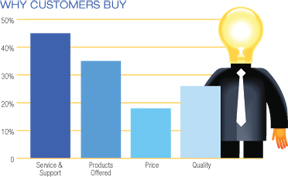Customer intelligence that impacts the sales force

by Ty Swain
In today’s manufacturing and distribution industry, one thing is for certain. Competition is increasing, and the importance of knowing what customers want and expect is crucial to successful selling, new product development and forecasting in this tough, ever-changing market economy.
Over the past two to three years, much has changed in the industry. Customers are buying differently from ever before, companies are more strategic in what they do and how they go to market, and business is more complex and dynamic than ever before.
Today, customers want it all – technology, price, relationship and service – and they want it faster, cheaper and with the best service. A truly complex selling environment has formed. Industry research shows that the average company loses 10% to 15% of customers yearly, and only 4% will tell you about it.
To support sales success, marketing efforts, product development, customer retention programs, pricing methods, etc., you must know WHY, WHAT and HOW customers want to do business now and in the future, or your sales team is simply selling blind. To identify what a customer wants and expects, they need to have a “voice” to define their needs, expectations and even offer ideas and suggestions. At Growth Dynamics, we call this customer intelligence.
According to the 2013 McGladrey Manufacturing and Distribution Monitor, over 80%
of companies are targeting existing markets for sales growth. To effectively target existing
markets, knowing what your customers want and expect from your sales force and your company is critical to new business development and customer growth and retention. Today, most sales teams struggle to know specifically what customers want and expect and they struggle to adapt to an ever-competitive and changing marketplace.
Helping a sales team see what customers want and expect, and helping them see what they can do to increase sales, customer retention or develop future business is a win-win for your company. By providing your customers with a “voice” to define how their business has changed, and to understand their needs, expectations and recommendations, you arm your sales team with information, recommendations, details and metrics (customer intelligence) so they can sell more effectively and retain customers. Loyal customers today expect the sales force to truly understand their business, make recommendations and offer solution-based services, not just take orders.
 What is Customer Intelligence?
What is Customer Intelligence?
Customer intelligence is based on gathering customer-relevant data that supports the business relationship and increases knowledge share to advantage customer retention and sales performance. How do you differentiate yourself in the marketplace? How do you really find out what customers want and expect if it is constantly changing? You want to know why, what and how to grow your business, and your customer has the answers.
This can be accomplished with an effective customer intelligence program aligned with company sales and marketing leadership goals. Unlike satisfaction surveys, a strategic customer intelligence survey should be designed specifically to market your company, engage customers in dialogue and prompt decision makers or buyers with an experience that both brands your company programs and services, while also gathering critical customer intelligence.
The most effective customer intelligence program is designed to assess, measure and collect information on key target issues. Providing an environment for customers to communicate their needs and expectations to earn or retain their business while allowing them to measure products, services and support and offer insight into new products, competition and pricing strategies can improve customer relations and drive increased sales. Most importantly, learning what customers plan to buy, who they buy from and why, can help your leadership and sales team develop strategies for growth in the marketplace.
A company-specific, customized customer intelligence survey provides valuable insight into customers’ buying expectations – how, what and why they buy today and in the future, product and service needs, inside and field support effectiveness and generates leads for the sales organization.
In the survey and customer retention industry, this is called a SMART survey (Strategic, Measurable, Aligned, Relevant, and Targeted). A successful SMART survey that elicits strong customer response (50-60% response rate) will provide the following business intelligence and results:
- Effectively market and communicate your company’s programs and services
- Assess and measure your products, services, programs and pricing
- Measure sales effectiveness, customer service, delivery or quality
- Analyze current and future customer needs, expectations or requirements for success
- Attract leads, new business opportunities
- Define key decision makers, new contacts and even customer contact info (e-mails, numbers, etc.) and what they expect
- Trend results by target areas (territory, product type, customer, market or business type)
- Leadership recommendations that support sales, marketing, service, future needs and growing or improving customer sales and retention
The result is a true sales and marketing solution that harnesses customer intelligence to generate trends, recommendations and market focus for increased sales and market penetration.
Although many companies inundate a company with research, numbers, data and statistics, the most effective results are trended to align with customer expectations.
To establish the best possible outcome, customer intelligence must engage and define the needs of information required in corporate leadership, marketing, product development, sales and even customer support. Defining the goal of the customer intelligence process is critical to establishing a SMART survey that results in the data and trends we seek, not to mention great ideas and suggestions from the customer.
After the Survey
A critical but often forgotten part of the survey process is to send a thank you to customers who took the time to offer ideas and feedback and to communicate results and success of the survey. Second, present the results to your sales and service teams to share your findings, present new information and recommendations and have them follow-up on new opportunities, requests or leads generated. This is a powerful way to assure customer needs are supported and business opportunities are realized.
In today’s competitive marketplace, leadership is seeking ways to increase sales, retain customers and introduce new products or services that support the customer and grow business. Business intelligence generates invaluable data and recommendations that allow you to develop new products and services, saturate customer accounts, increase sales and assure that as you grow you are aligned with your customer. Defining a customer’s real needs and goals is a complex mix but the customer is the key to helping you define what is most important to growing and retaining their business.
With effective customer intelligence you can arm your sales force to go out and navigate a new and ever-changing customer landscape. Customer intelligence is your customer’s “voice” to your business success.
 Ty Swain is CEO of Growth Dynamics, which provides world-class sales solutions for the selection, performance and retention of top performers in today’s leading organizations. Contact him at www.gdicorp.com or at (877) 434-2677.
Ty Swain is CEO of Growth Dynamics, which provides world-class sales solutions for the selection, performance and retention of top performers in today’s leading organizations. Contact him at www.gdicorp.com or at (877) 434-2677.
This article originally appeared in the Sept./Oct. 2013 issue of Industrial Supply magazine. Copyright 2013, Direct Business Media.












